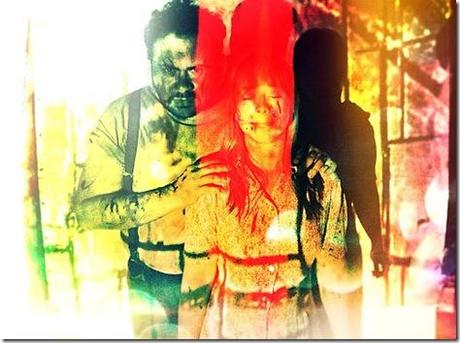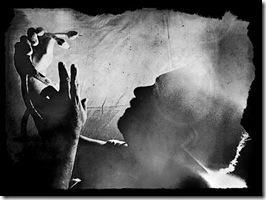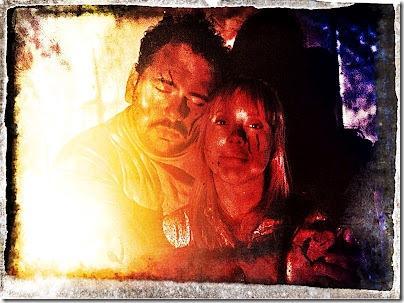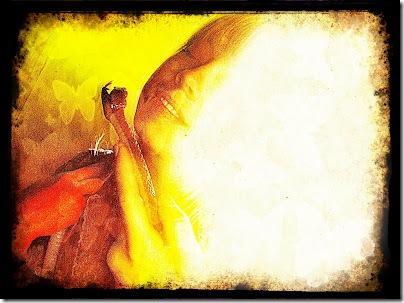
Don’t Give That Beast a Name
Written by Randall Colburn and Bob Fisher
Directed by Bob Fisher
at Zoo Studio, 4001 N. Ravenswood (map)
thru Nov 3 | tickets: $20 | more info
Check for half-price tickets
Read entire review
Powerful storytelling makes this ‘Beast’ a beauty

The Mammals presents
Don’t Give That Beast a Name
Review by Joy Campbell
In the Mammals’ premier of their original script, Don’t Give That Beast a Name, they tackle the weighty and complex subject of sin and redemption. Set in Appalachia, where Scripture is well quoted if not well followed, it opens with the story of Marie (Erin Elizabeth Orr), a woman running from her checkered past and hoping to find redemption in the love of Frank (Gabe Garza), a sweet, simple man who believes in love at first sight. The two settle down and start a family, but Frank’s feelings of guilt over their poverty and his inability to provide for them create an emotional vulnerability that leads him to fall under the spell of ecstatic snake handlers. They promise that if he can handle a serpent unharmed he will prove his faith and be redeemed from his imperfection (that he is perhaps the kindest, most innocent, and least in need of redemption of them all is a central irony). Marie vehemently opposes this (“I know God; this isn’t God”), refuses to have anything to do with it, and a rift develops between them.

While it would be easy for a story about the old-time religion of backwoods hill people to fall into parody, Colburn and Fisher’s script lovingly creates real people who are warm, human, and, while frail and sometimes humorous, never a mockery. We feel their passion and pain; even the snake handlers, while disturbing, make us feel their conviction, no matter how misguided it may seem (note to the snake-phobic: no real snakes are used in the show). The performances are sincere, the acting superb, and the various characters, even when broadly drawn, wholly believable. Illustrations of the ways in which our attitudes bear on our beliefs run the gamut from maternal preacher woman Sunday Morn, whose love for God is made manifest by showing up at the Honky Tonk on Saturday night to dispense communion to her adoring audience, to a radio pastor who has “thirty-six consecutive wins” at scripture debate, to the young preacher also trying to put his past behind him in an honest attempt to find God’s love, to the hard-hearted leader of the snake-handling cult.

While the script is delightfully original, it has a lot going on, and that is its main flaw. In the attempt to probe the various notions of redemption and self-torment, the narrative gets disjointed — the relationship between Frank and Marie so carefully established at the show’s onset becomes almost secondary to the various ideas and character issues the play is trying to explore. While each scene is powerful, the script could use some trimming and streamlining to allow for more character development and exploration of back-story, which is often hinted at but never really explored.
As Marie, Orr captures the sweet optimism of a woman hoping to escape her past, and her desperate struggle when it persists in tempting her; Garza’s Frank wins our hearts with his kindness and innocence, and breaks them with his self-punishing attempts at finding atonement. Also remarkable is Sean Ewert as the cross-dressing town simpleton Tinkerbell, a heartbreaking character reviled and brutalized by all but Frank. The ensemble members, all excellent, play various roles with exuberance and conviction, and draw us in from the start with a welcome to the honky tonk where corn bread and lemonade are dispensed to audience members in a form of secular communion.
The show is a visual and aural pleasure. John Wilson’s creative and flexible set design combined with Mike Smith’s rich lighting allow a narrow performance area to become a honky tonk, valley home, radio station, and occult place of worship. The use of lanterns is highly effective in establishing an atmosphere at once simple and magical. Particularly impressive is the gorgeous use of ambient sound and music to mesmerizing effect; from recorded hymns to beautifully sung church songs by the ensemble, we are continually reminded that God is never far. The challenge, however, is not in obtaining God’s forgiveness, but our own.
Rating: ★★★½
Don’t Give That Beast a Name continues through November 3rd at Zoo Studio, 4001 N. Ravenswood, Suite 205 (map), with performances Fridays and Saturdays at 8pm. Tickets are $20, and are available online through BrownPaperTickets.com (check for half-price tickets at Goldstar.com). More information at TheMammals.blogspot.com. (Running time: 2 hours, includes an intermission)

artists
cast
Gabe Garza (Frank); Erin Orr (Marie); Jamie Bragg (Annabelle Leroy, Ensemble); Liz Chase (Sunday Morn); Sean Ewert (Tinkerbell); David Fehr (Other Man, Radio, Wellington); Sarah Koerner (Bartender, Prophetess); Elise Mayfield (Ensemble, Rebecca E. Leroy); AJ Miller (Dusty Daniels); Erin Myers (The Man in the Red Headlights); Anthony Stamilio (Drumm, Ensemble); Gene Van Dyke (Captain Leroy); Nicolle Van Dyke (Bartender, Prophetess, Understudy)
behind the scenes
Bob Fisher (director, co-author); Randall Colburn (co-author); John Wilson (scenic design); Mike C. Smith (lighting design); DeChantel Kosmatka (costumes); Daniel Kerr Hobert (puppet design); Ashley Corbett (board op); Kiri Palm (props); Byron Roussin (stage manager)
12-0954

